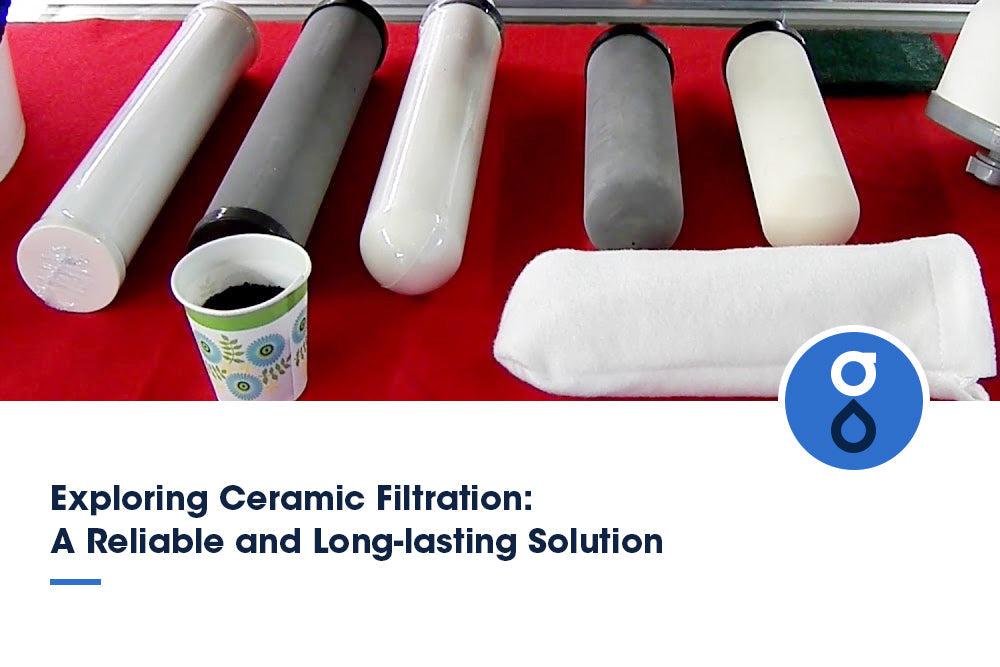Table of Contents:
What is a whole-house water filtration system
Types of whole-house water filtration systems
Benefits of whole-house water filtration systems
Factors to consider when choosing water filtration systems
Tips for the installation and maintenance of whole-house water filtration systems
FAQs
Conclusion
Having clean, contaminant-free water from every faucet and showerhead in your home is a luxury many homeowners take for granted. But did you know that even if your city's water supply meets EPA standards for safe drinking water, it can still contain harmful contaminants like lead, chlorine, pesticides, pharmaceuticals, and microplastics?
Installing a whole-house water filtration system is the best way to remove these impurities and protect your family's health. In this blog post, we'll explore the different types of whole-house filters, their benefits, what to consider when choosing one, tips for installation and maintenance, and frequently asked questions.
What is a whole-house water filtration system

A whole-house water filtration system is designed to filter all the water entering a home. Unlike under-sink or countertop filters that only handle water from a single faucet, whole-house systems treat all water used for drinking, cooking, bathing, and more. This comprehensive approach removes a wide range of contaminants and provides cleaner, healthier water throughout the home.
Types of whole-house water filtration systems
There are several options to consider when it comes to whole-house water filtration systems.
Sediment filters
Sediment filters are a must-have addition to your whole-house water filtration system to remove larger particles and debris from your water supply effectively. Sediment filtration plays a crucial role in maintaining water quality by trapping sediments that can affect its taste, odor, and clarity. Regular filter maintenance is essential to ensure optimal sediment removal and filtering efficiency. Over time, sediment filters can become clogged with accumulated sediments, reducing effectiveness. To prevent this, cleaning or replacing the sediment filters regularly is essential.
Carbon filters

Carbon filters effectively remove chlorine, volatile organic compounds (VOCs), and other impurities from your drinking water. Activated carbon, the main component of these filters, has a high surface area that allows it to trap and absorb contaminants. This makes carbon filters one of the most popular choices for water filtration. They are known for their effectiveness in improving water taste and odor.
The activated carbon needs to be replaced periodically, typically every 6 to 12 months, depending on the level of water contamination. In terms of environmental impact, carbon filters are a more eco-friendly option compared to other water filtration methods. They do not require electricity to operate and do not produce wastewater during the filtration process. Additionally, the used carbon filters can often be recycled.
Reverse osmosis systems

Reverse osmosis systems use a semi-permeable membrane to remove contaminants from drinking water. With reverse osmosis, you can enjoy the benefits of clean and pure water right at your fingertips. This filtration method not only improves the taste and odor of your water but also eliminates harmful substances such as lead, chlorine, and bacteria.
Compared to other filtration systems, reverse osmosis stands out for its ability to remove a wide range of contaminants, ensuring high water quality. Additionally, maintenance for reverse osmosis systems is relatively straightforward, typically involving filter replacements every 6-12 months. Installation of a reverse osmosis system is also possible at the point of use, such as under the kitchen sink or as a whole-house system.
Water softeners
Installing a water softener can greatly improve tap water quality by reducing the presence of minerals like calcium and magnesium. Here are three benefits of water softeners:
1. Healthier Skin and Hair: Hard water can leave residue on your skin and hair, causing dryness and irritation. You can prevent these issues by softening the water and enjoying softer, smoother skin and hair.
2. Longer Appliance Lifespan: Hard water can lead to mineral buildup in your appliances, reducing their efficiency and lifespan. With a water softener, you can prevent this buildup and extend the life of your devices, saving you money in the long run.
3. Cleaner, Spot-Free Dishes: Hard water can leave spots and residue on your dishes, making them look dirty even after washing. By using a water softener, you can ensure spot-free dishes and a cleaner, more sparkling kitchen.
When comparing water softeners, consider factors such as the type of softening method (salt-based or salt-free), capacity, regeneration process, and maintenance requirements. Understanding how water softeners work can help you make an informed decision and choose the best option for your home.
Benefits of whole-house water filtration systems
If you're considering a whole-house water filtration system, you'll be glad to know that it offers several benefits.
Remove harmful contaminant
One of the benefits of whole-house water filtration is that it can effectively remove harmful contaminants. Investing in a whole-house water filtration system can greatly improve your health and ensure the safety of your drinking water.
Here are three reasons why removing harmful contaminants is crucial:
1. Improve Health: Whole-house water filtration systems are designed to remove impurities such as chlorine, lead, pesticides, and bacteria from your water supply. You can protect yourself and your family from potential health risks by eliminating these harmful substances.
2. Water Safety: With whole-house filtration, every faucet in your home will deliver clean and safe drinking water. You won't have to worry about contaminants lurking in your water supply, giving you peace of mind.
3. Advanced Filtration Technology: Whole-house water filtration systems utilize advanced technology to remove contaminants effectively. These systems often include multiple stages of filtration, ensuring that your water is thoroughly cleansed and free from impurities.
Improve water taste and odor

To improve the taste and odor of your drinking water, you can rely on a whole-house water filtration system. This system not only enhances your water's flavor but also provides numerous health benefits. With water quality improvement as its primary goal, a whole-house filtration system removes impurities such as chlorine, sediment, and bacteria, resulting in cleaner and fresher-tasting water.
Protect plumbing and appliances
Regular maintenance of a whole-house water filtration system is crucial for protecting the plumbing and appliances in your home. Ensuring that your filtration system is maintained correctly, you can enjoy numerous benefits for your plumbing and appliances.
Here are three reasons why regular maintenance is essential:
1. Plumbing Protection: Regular water filtration system maintenance helps prevent the buildup of sediments and minerals in your pipes, reducing the risk of clogs and corrosion.
2. Appliance Maintenance: A well-maintained filtration system ensures that your appliances, such as dishwashers and washing machines, are protected from the damaging effects of contaminants, prolonging their lifespan.
3. Improved Water Quality: Regular maintenance ensures that your filtration system is functioning optimally, providing you with clean and safe water for drinking, cooking, and bathing. This translates to long-term health benefits for you and your family.
Investing in regular maintenance for your whole-house water filtration system protects your plumbing and appliances. It ensures the long-term benefits of improved water quality and health benefits for you and your loved ones.
Avoid single-point solutions
When it comes to avoiding single-point solutions, you should explore alternative options for improving your water quality. A whole-house water filtration system offers numerous benefits and advantages over single-point solutions. Not only does it provide clean and safe water for drinking, but it also ensures that every tap in your home delivers high-quality water. With a comprehensive solution like a whole-house water filtration system, you can enjoy the efficiency of meeting all your water needs in one go.
This saves you time and effort compared to using multiple filters or devices. Additionally, investing in a whole-house water filtration system can lead to long-term savings by reducing the need for individual filters and costly repairs to plumbing and appliances. It is the most efficient and cost-effective way to improve water quality.
Cost saving
Investing in a whole-house water filtration system can lead to long-term savings by reducing the need for individual filters and costly repairs to plumbing and appliances. Here are the reasons why it's a wise long-term investment:
1. Health benefits: A whole-house water filtration system ensures that all the water in your home is free from harmful contaminants, such as chlorine, lead, and bacteria. This means cleaner and safer water for drinking, cooking, and bathing.
2. Environmental impact: Using a whole-house water filtration system can reduce your carbon footprint. You won't need to buy bottled water or use plastic filters, significantly reducing plastic waste.
3. Water quality improvement: Whole-house filtration improves your water's taste, odor, and clarity. It removes impurities that can affect the quality of your water and make it less enjoyable to use.
Investing in a whole-house water filtration system improves water quality, provides long-term cost savings health benefits, and reduces environmental impact. It's a convenient and easy-to-use solution for your home's water needs.
Factors to consider when choosing water filtration systems

Here are vital factors to consider when selecting a whole-house water filter:
- Filtration needs - Consider your water quality concerns, whether you need sediment removal, chlorine and chemical reduction, softening, bacteria removal, etc. Your filtration system should address your specific water problems.
- Flow rate and pressure - Choose a system to handle the home's water demands at sufficient pressure. Undersized systems result in weak force.
- Maintenance - Some filters, like RO membranes, require occasional replacement. Others, like UV systems, need bulb replacement every 12-24 months. Factor in ongoing maintenance costs.
- Filter lifespan - How often filters need replacing depends on the type. Sediment filters may need replacement every 3-6 months, while carbon filters can last 2-5 years. Consider replacement frequency and costs.
- Ease of installation - Many whole-house systems require professional installation, while others are DIY-friendly. If going the DIY route, make sure to follow instructions carefully.
- Filtration stages - Multiple filtration stages like sediment-carbon-UV provide more complete contaminant removal. More steps mean improved water quality but also higher upfront costs.
Tips for the installation and maintenance of whole-house water filtration systems
Proper installation and ongoing maintenance are key to getting the most out of a whole-house water filtration system. Here are some top tips:
- Read all instructions thoroughly before installing filters and conditioning tanks. Note special requirements.
- Allow sufficient space around the system for replacing filters, servicing parts, and drainage lines if applicable.
- Install before the water softener and any pressure tanks. Install sediment pre-filters first to extend other filter lifespans.
- Disinfect cartridge housings upon installation according to manual guidelines to avoid contamination.
- Replace filters per manufacturer recommendations - don't wait until they appear spent. Mark calendars with replacement dates.
- Keep spare cartridges on hand to enable quick change-outs when replacement is due.
- Inspect tubing, connections, fittings, and o-rings periodically for leaks or cracks requiring repair.
- Clean UV bulb sleeves regularly if present in your system, as mineral deposits can block effectiveness.
- Test water yearly to ensure your whole-house system performs optimally and removes target contaminants.
FAQs
What are the pros and cons of whole-house vs. point-of-use filtration?
Whole-house filtration treats all water entering the home but has higher upfront costs. Point-of-use treats water at specific taps but doesn't cover all water usage.
How often do whole-house water filters need to be changed?
Most filters need replacement every 2-6 months, depending on water usage and contaminant levels. Check manufacturer recommendations.
What is the typical cost for a whole-house filtration system?
Costs range from $500 - $2,000, including equipment and professional installation. Higher-end systems with multiple filters can cost up to $4,000.
Conclusion
Adding whole-house water filtration provides cleaner, better-tasting water for drinking, cooking, bathing, and all other uses. The right filtration system removes contaminants of concern while preserving healthy minerals. With so many filtration options available and factors to weigh, take time to determine the best system for your home's needs and budget. Proper installation and routine maintenance will keep your whole-house water filtration performing optimally for years.
















